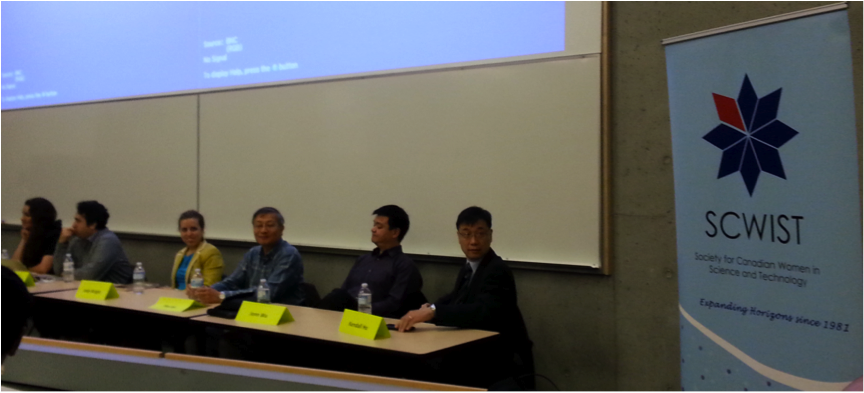Explore Career Paths that Combine Life Sciences with Computer Sciences [Event Recap]
Back to Posts
On November 12th, in collaboration with UBC Computer Science and UBC eHealth Strategy Office, SCWIST organized a panel discussion featuring six experts in digital health. The focus of the evening is to discuss the promising future and growing demand for talents to work at the intersection of Computer and Life Sciences. The panel included two successful entrepreneurs and developers of mobile health applications (Alireza Davoodi and Maryam Sadeghi) as well as four leading researchers in academia (Dr. Jody Wright, Dr. Tim Lee, Dr. Jonn Wu and Dr. Kendall Ho).
To kick-off the discussion, Maryam Sadeghi, CEO and Co-Founder at MetaOptima Technology, encouraged aspiring entrepreneurs to prepare themselves while still in school. Some of her valuable insights include: growing your network by regularly attending conferences and practising how to sell by presenting your work.
Dr. Jonn Wu discussed how technology had a significant impact on his work as a Radiation Oncologist at BC Cancer Agency. Using technology, he’s able to deliver higher and concentrated doses to treat tumors efficiently while reducing side effects to critical parts of the body. To further understand how the digital revolution will create better healthcare, he recommended the book “The Creative Destruction of Medicine“ by Eric Topol
Dr. Kendall Ho, the Director of the UBC eHealth Strategy Office, compared dancing with an analogy on how to bridge the gap between health and computer science. He emphasized the need for both fields to communicate and collaborate. “It takes two people to dance well at the intersection of Health and Computer Sciences”, said Dr. Ho. As a medical practitioner, he emphasized that technology cannot replace personal interactions. Maryam echoed this comment, “even if you are an expert in your field, you have to visit the clinics to understand how patients and health professionals can benefit from your technology.”
The inspiring discussion left the students excited about the vast and diverse opportunities in Health IT. During the Q&A session, Dr. Michael Gold, moderator and the Department Head of UBC Microbiology, encouraged students to take advantage of their Co-Op experiences to get a taste of working in the industrial and academic side of Health IT.
Finally, this event would not be possible without the help of the UBC Computer Science (Michele Ng and Giuliana Villegas) and the UBC eHealth Strategy Office (Vivian Wong and Joanna Pedersen).
UBC offers a 20-month, Bachelor of Computer Science degree program for graduates who possess a bachelor or graduate degree. If you have a background in Life and Health Sciences (within or outside of Canada) and are looking to make a career transition into the IT world, find out more about this program.
https://www.cs.ubc.ca/students/undergrad/programs/second-degree/index.html
Written by Lee Ling Yang
Photo credit: Blanca Rodriguez and Citali Cruz


